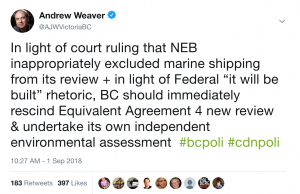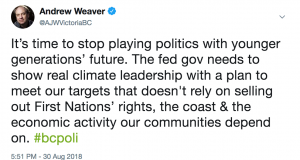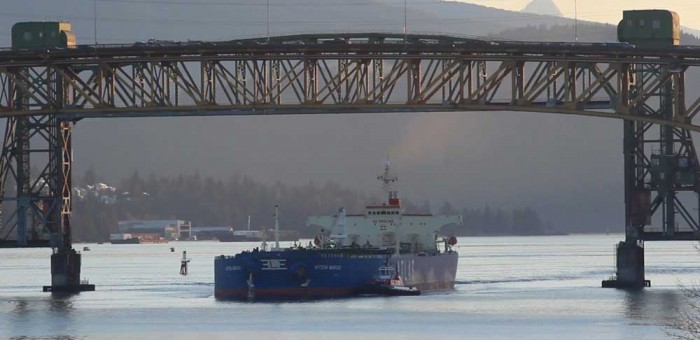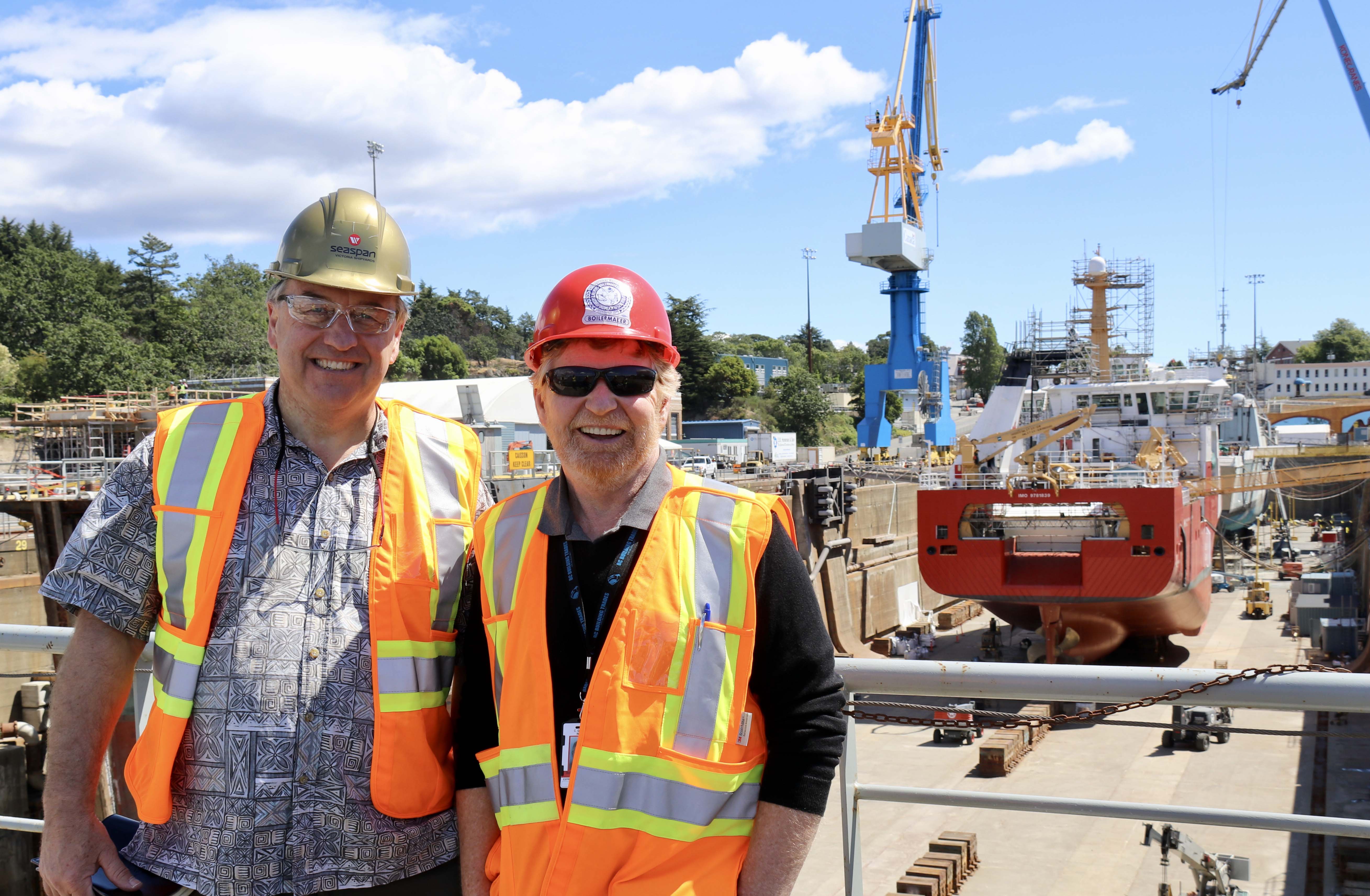Issues & Community Blog - Andrew Weaver: A Climate for Hope - Page 48
On the need for a made-in-B.C. environmental assessment of the Trans Mountain expansion project
Last week, the Federal Appeal Court ruling revealed that politics was put ahead of evidence and reconciliation in the federal cabinet approval of the Transmountain pipeline project. My colleague Adam Olsen, MLA for Saanich North and the Islands and I both feel vindicated after many years serving as intervenors in the NEB process. The reasons cited in the Federal Court of Appeal ruling validated the key aspects of our arguments during the intervention process.
This presents an opportunity for the BC Government to step in and stand up for the protection of our coast.
On January 11, 2017, then Premier Christy Clark announced that her government’s five conditions had been been met. The Transmountain Pipeline project was given the green light.
Reacting to the announcement, John Horgan said he planned to “use every tool in our tool box” to stop the project. Indeed, these same words are embedded in our confidence and supply agreement:
“Immediately employ every tool available to the new government to stop the expansion of the Kinder Morgan pipeline“
 Well the BC Government has now been granted the ultimate tool. Given that the provincial cabinet’s approval of the project relied on the same NEB report, and in light of the Federal Court of Appeal’s ruling that the report was “impermissibly flawed”, the BC Government has the opportunity to pull out of the Equivalency Agreement and conduct its own, independent environmental assessment.
Well the BC Government has now been granted the ultimate tool. Given that the provincial cabinet’s approval of the project relied on the same NEB report, and in light of the Federal Court of Appeal’s ruling that the report was “impermissibly flawed”, the BC Government has the opportunity to pull out of the Equivalency Agreement and conduct its own, independent environmental assessment.
This is particularly important in light of the “it will be built” rhetoric emanating from the Trudeau government. How can British Columbians trust an environmental assessment process when the final answer has already been prescribed? The answer is simple, it can’t.
Below is the media statement that we released yesterday on this topic. There is an excellent contextual analysis of the issue in ‘s article that was published yesterday in the Star Vancouver.
Rest assured, the BC Green Caucus will closely monitor government’s response to our call. We don’t see any compelling reason not to pull out of the equivalency agreement in light of the fact that it is such an important tool now available in the so-called BC NDP toolbox.
Media Release
Andrew Weaver statement on the need for a made-in-B.C. environmental assessment of the Trans Mountain expansion project
For immediate release
6 September 2018
VICTORIA, B.C. – Today Andrew Weaver urged the Province to undertake its own made-in-B.C. environmental assessment of the Trans Mountain pipeline.
“It is clear that B.C. cannot rely on the Federal government to protect our environment from the risks of this project”, said Andrew Weaver, Leader of the B.C. Green Party.
“The Federal Court of Appeal has ruled that there were ‘successive, unacceptable deficiencies’ in the NEB report. As a result, they found that the NEB’s report and recommendations could not be relied upon to make a decision in the public interest.
“Yet the Federal government insists that they will get this pipeline built. This rhetoric shows that they have already determined the outcome, and that they are in a rush to build this pipeline. As a result, it is clear that we cannot trust the Federal government to proceed in an objective and unbiased manner.”
The previous provincial government signed an equivalency agreement with the NEB in 2010, which meant that B.C. relied upon the NEB report in issuing its environmental certificate for the Trans Mountain expansion.
“B.C. needs to be in control of our own environmental review process, to make sure it is objective and evidence-based”, said Weaver. “The provincial government should terminate the equivalency agreement signed by the previous administration. Now is the time to use the tools at our disposal to ensure our environment is protected from the risks of an oil spill.”
-30-
Media contact
Sarah Miller, Acting Press Secretary
+1 250-858-9891 | sarah.miller@leg.bc.ca
Statement on Labour Day
Monday September 3 is Labour Day, a day where we collectively recognize the achievements of Canadian workers and the right of all British Columbians to safe and equitable employment. Below is the media statement I released in celebration of Labour Day.
Media Statement
Andrew Weaver statement on Labour Day
For immediate release
August 31, 2018
VICTORIA, B.C. – Andrew Weaver, leader of the B.C. Greens, issued the following statement today in recognition of Labour Day:
“On Labour Day we recognize the achievements of Canadian workers and the right of all British Columbians to safe and equitable employment.
“Our job landscape is changing. Amidst trends like the rise of the gig economy, the ever-changing nature of technology and the implications of climate change, it is vital that governments actively modernize our policies in order to support workers.
“We are excited about the successes of the past year. The Emerging Economy Task Force, for example, is analysing changing trends in the economy to propose policy options for government to ensure our continued success. The Basic Income Expert Committee is exploring how to best support low-income British Columbians so that we are all better prepared for the changing horizons of the workforce. Increased investments in advanced education, skills, and training are helping our workforce grow and diversify.
“As we head into the fall we continue to focus on the changing nature of work and strive to bring British Columbians the investments and services they need to succeed.
“On behalf of my colleagues, I’d like to wish all British Columbians a safe and happy Labour Day weekend.”
-30-
Media contact
Jillian Oliver, Press Secretary
+1 778-650-0597 | jillian.oliver@leg.bc.ca
Federal Court Ruling show politics put ahead of evidence and reconciliation in federal approval of pipeline
Today the Federal Court of Appeal released its decision on the long awaited Tsleil-Waututh Nation v. Canada (Attorney General) court case. In what should be the final death knell for the project, the Federal Court of appeal ruled that:
- The Board unjustifiably defined the scope of the project under review not to include project-related tanker traffic. This exclusion permitted the Board to conclude that, notwithstanding its conclusion that the operation of project-related marine vessels is likely to result in significant adverse effects to the Southern resident killer whale, the project was not likely to cause significant adverse environmental effects. The unjustified exclusion of project-related marine shipping from the definition of the project rendered the Board’s report impermissibly flawed: the report did not give the Governor in Council the information and assessments it needed in order to properly assess the public interest, including the project’s environmental effects—matters it was legally obligated to assess.
-
The Government of Canada was required to engage in a considered, meaningful two-way dialogue. However, for the most part, Canada’s representatives limited their mandate to listening to and recording the concerns of the Indigenous applicants and then transmitting those concerns to the decision-makers. On the whole, the record does not disclose responsive, considered and meaningful dialogue coming back from Canada in response to the concerns expressed by the Indigenous applicants. The law requires Canada to do more than receive and record concerns and complaints…The duty to consult was not adequately discharged.
The result is that the soon-to-be-taxpayer-owned project must redo “phase 3” of the consultation process and send the project back to the newly-constituted NEB process for a reassessment of the effects of increases in marine shipping.
As readers might imagine, I am delighted by the decision. My colleague Adam Olsen, MLA for Saanich North and the Islands and I both feel vindicated after many years serving as intervenors in the NEB process. We are grateful to the Tsleil-Waututh, Squamish, Coldwater, Secwepemec and other First Nations, along with the cities of Burnaby and Vancouver, for their efforts to ensure that the appropriate evidence was brought before the Federal Court of Appeal. We should not forget that the resources that could have been put to use in their communities were instead directed to the legal challenge.
The decision today is both a victory for science and evidence-based decision-making (ruling 1. above) as well as a victory for indigenous rights (ruling 2.). As the only sitting MLA to seek intervention status, my focus as an intervenor was almost exclusively on the former, culminating in an Open Letter to Prime Minister Trudeau in November, 2016.
I  was very disappointed by the petty response of Rachael Notley to the decision. As I summarized in a tweet earlier tonight:
was very disappointed by the petty response of Rachael Notley to the decision. As I summarized in a tweet earlier tonight:
It’s time to stop playing politics with younger generations’ future. The fed gov needs to show real climate leadership with a plan to meet our targets that doesn’t rely on selling out First Nations’ rights, the coast & the economic activity our communities depend on.
In response to the ruling, my office issues a media release which is reproduced below.
Media Release
Weaver: Federal Court Ruling show politics put ahead of evidence and reconciliation in federal approval of pipeline
For Immediate Release
August 30, 2018
VICTORIA, B.C. – Andrew Weaver, leader of the B.C. Green Party, congratulated the First Nations and local governments on the Federal Court of Appeal’s ruling today that federal government made its decision without considering all evidence and failing in their legal duty to consult First Nations. Weaver, who was an intervener in the National Energy Board hearings, says the ruling is further proof that the project should have never been approved.
“Today’s ruling is a victory for First Nations’ rights and for all those who have long held that this project was not approved based on evidence,” said Weaver.
“I am particularly glad to see the court’s judgement that there was an unjustifiable failure at the heart of the federal government’s approval of this project: the failure to assess the impacts of marine shipping on the environment. This was an outrageous omission on the part of the federal government that flies in the face of their stated commitment to evidence-based decision-making. The NEB acknowledged that the marine traffic from this project posed significant harm to the endangered Southern Resident Killer Whales. The government must now justify to Canadians, and to the world, why it is willing to herald the death knell of this irreplaceable species if it continues to pursue this project.
“Coming off of the two worst wildfire seasons in B.C.’s history, it’s clear that we cannot continue down the misguided path of expanding fossil fuel infrastructure. We owe it to our children and grandchildren to begin the immediate transition to the low-carbon economy. B.C. is a leader amongst the provinces, adopting carbon tax increases that are ahead of federal requirements. Our Caucus is working closely with the B.C. NDP minority government to create a clean growth strategy that will further advance our efforts. I hope the federal government will now realize that there is an enormous opportunity to support B.C.’s leadership, rather than attempting to force our province to shoulder the huge environmental and economic risks that this project presents.”
-30-
Media contact
Jillian Oliver, Press Secretary
+1 778-650-0597 | jillian.oliver@leg.bc.ca
On Ontario’s cancellation of its basic income pilot
Over the last week, I have been following the news that Ontario has decided to cancel its basic income pilot, only one year into what was supposed to be a 3-year project.
I am saddened by the decision made by the government of Ontario, for a number of reasons.
I was, of course, looking forward to learning from Ontario’s pilot project, which would have provided a wealth of evidence about the effects of basic income. Ontario was leading the country in assessing the impacts of this policy, and their project was being watched around the world. They were tracking changes in employment, health, education, food security and housing, as well as community-level effects in Lindsay, with independent assessment by university researchers.
Before Ontario, the last pilot in Canada took place in Dauphin, Manitoba, over 40 years ago. This pilot illustrated some very promising results: in just 3 years, hospital visits were reduced by 8.5%.
Researchers attributed this marked decrease to lower levels of stress in low income families, which resulted in lower rates of alcohol and drug use, lower levels of domestic abuse, fewer car accidents, and lower levels of hospitalization for mental health issues.
In deciding to cancel the pilot, Ontario, and our whole country, has lost a significant opportunity to learn about the effects of basic income and to be on the leading edge of exploring this policy.
But what has struck me the most in the last week since the news of cancellation are the individual stories coming out of Ontario, from those enrolled in the pilot, whose lives are deeply affected by this decision.
So many stories have highlighted how people’s lives changed once they began receiving basic income. These stories have highlighted, too, the substantial human cost to cancelling this pilot part way through, when thousands of people had made plans and decisions on what they thought was stable ground.
Some participants in the pilot decided to attend college for the first time, or returned to school, to pick up the skills needed for meaningful employment or to start a new career. Others began living independently, or found secure accommodation for the first time. For some, it was the newfound ability to afford healthy food and other small things to improve the quality of their lives, and the lives of their children. Others used the income to pay down long-standing debts.
Many spoke about the reduced stress they felt, the ability to plan into the future instead of worrying only about the day-to-day, and a feeling of greater independence and dignity.
Many participants in the program were working, but still couldn’t afford the necessities of life and make ends meet.
One individual who was part of the pilot wrote to me highlighting the impact that basic income had on him and his family. Despite both working, he and his wife had amassed a significant amount of debt, which they struggled to pay off as they tried to provide for their children. The program, he said, was allowing them to pay down their debt and do more with their children. Most importantly, he said, he could finally see the light at the end of the tunnel to better days, for him and his children.
In his words, “this program … gave people that really needed hope a lot of hope for a brighter future.”
These individual stories speak to the promise I believe basic income holds – as a better way to support people as they navigate the economic challenges of the 21st century. Recent years have seen disproportionate increases in part-time and contract work. Wages have stagnated while the cost of living in our cities has spiralled out of control. Meanwhile, studies estimate that half of Canadian jobs could be impacted by automation in the next decade alone. We proposed exploring basic income in B.C. because we believe that government needs to have a plan for the changes on the horizon.
The experiences of people in Ontario has made me see even more strongly the need to do serious work exploring this policy. I have previously written a four part series (Part I, Part II, Part III, and Part IV) outlining why I think basic income is an idea that we need to explore in BC. Establishing a pilot project formed a key aspect of the Income Security component of our BC Green 2017 election platform.
We’re forging ahead in BC with our expert committee, an expert panel comprising three distinguished researcher that launched last month and is studying how basic income could work in BC. This committee is the first step towards fulfilling a government commitment under CASA to pilot basic income in BC. I am hopeful that the committee’s work will provide the evidence that governments need to decide how to proceed – not only here in BC, but across Canada.
In this time of change, as we grapple with the challenges we face today and on the horizon, policymakers have a responsibility to plan for the future, and to make decisions that will give their citizens the best possible chance to pursue their dreams and to achieve success. In a country as wealthy and as compassionate as ours, that’s the goal our leaders should be working towards.
B.C. Greens welcome ALR report and urge government to act on house size restrictions
The BC Government today released the interim report of the B.C. Minister of Agriculture’s Advisory Committee for Revitalizing the Agricultural Land Reserve and the Agricultural Land Commission. As noted in the accompanying press release, the committee identified 13 recommendations for legislative and regulatory change, and four recommendations for action to protect the ALR. It also identified 14 key issues that are still under consideration for its final report.
Our caucus issued the press release reproduced below welcoming the report and urging the government to act quickly on the recommendations to limit house size on ALR land and to return the entire ALR to a single zone.
Media release
B.C. Greens welcome ALR report, urge government to act on house size restrictions and zone change
For immediate release
August 8, 2018
VICTORIA, B.C. – The B.C. Green caucus welcomed the Ministry of Agriculture Advisory Committee’s agricultural land reserve (ALR) revitalization report released today. The Caucus emphasized that the government should act quickly to adopt the recommendations to limit house size on ALR land and to return the entire ALR to a single zone.
“The ALR is crucial to supporting B.C. agriculture, farmers and our local food security,” said Adam Olsen, B.C. Greens spokesperson for agriculture.
“It has been increasingly under threat due to the preponderance of mega mansions, stemming from speculation in our real estate market. This is driving up prices at a time when the industry is facing a demographic crisis and young farmers are struggling to afford to buy land. I am pleased to that the committee recommends that the province limit house size on the ALR and I urge the government to swiftly adopt this recommendation.”
B.C. Greens leader Andrew Weaver added that the government should also adopt the committee’s recommendation to return the ALR to a unified zone.
“The previous B.C. Liberal introduced the zone changes in 2014, which opened up precious farmland to oil and gas exploration, among other non-agricultural industrial activity,” Weaver said.
“That was a short-sighted decision made at a time when we should have instead been investing in the sustainable industries of the future. As the world shifts to the low carbon economy, it is essential that we take every opportunity to support economic development, especially in rural communities, in sectors that will sustain us in the long-term. I thank the committee, especially Chair Vicki Huntington, for their excellent work on this report. We are reviewing the other recommendations in detail and look forward to working with government to advance legislation that will ensure a strong, revitalized ALR so that British Columbians can benefit from a thriving agricultural sector for generations to come.”
-30-
Media contact
Jillian Oliver, Press Secretary
+1 778-650-0597 | jillian.oliver@leg.bc.ca







